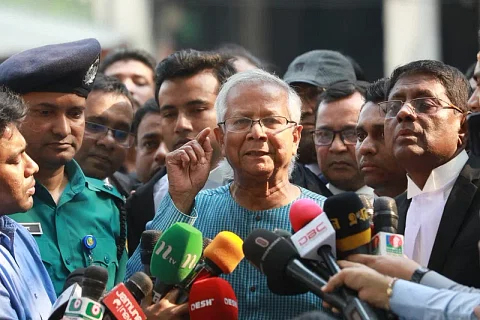“The monster is gone,” exulted Yunus, referring to his bitter critic Hasina, who would dismiss him as a “bloodsucker of the poor”
 KRC TIMES Desk
KRC TIMES Desk

Farid Hossain
After a student-led upsurge ended former Prime Minister Sheikh Hasina’s 15-year rule early this month, Bangladesh installed its most famous citizen—Nobel peace laureate Professor Muhammad Yunus—as its interim leader until a new election is held.
Yunus, 84, has the backing of the country’s powerful military and the endorsement of a group of anti-Hasina political parties that suffered during her rule characterised by highhandedness, widespread corruption, and denial of a free and fair national vote for years.
Yunus, founder of Grameen Bank, is known as a “banker to the poor”. He is credited with pulling out millions of Bangladeshis, mostly women, from poverty by giving them small loans to start businesses.
Ironically, on August 5—the day Sheikh Hasina stepped down and left for India before tens of thousands of protesters overran her official residence in Dhaka—Yunus was set for a court appearance to answer charges of embezzling over $2 million from Grameen Telecom, an allegation he has always denied.
He could have been handed a long jail term in addition to the six-month imprisonment (granted bail) he was given earlier for alleged violation of labour laws. Since his taking over as chief advisor to the interim government, all the cases—up to 190 filed by Hasina’s government—have been withdrawn. “The monster is gone,” exulted Yunus, referring to his bitter critic Hasina, who would dismiss him as a “bloodsucker of the poor”.
Sheikh Hasina, top Awami League leaders investigated on charges of genocide and crimes against humanity
Yunus’s first week in power saw him grappling to restore law and order, reorganising the battered administration and reaching out to minorities, especially the Hindus who suffered mob attacks on their homes, businesses and temples in parts of the country.
“We are one family, no room for division,” he reassured Hindu leaders during a visit to the Dhakeshwari temple in downtown Dhaka. “Establishing people’s democratic rights and human rights is the main goal of this government.”
Meanwhile, the Yunus-led interim government is talking more about “fixing the state” and reaping benefits of what has been called “the second independence”, than a plan to hold national elections and hand over power to elected representatives. Fixing the state means cleansing institutions such as the judiciary, Election Commission, Anti-Corruption Commission, government administration, universities and the central bank of Awami League loyalists.

As Yunus’s law advisor Asif Nazrul put it: “We are caught in the middle of two aspirations: the political parties want us to hold an election as soon as possible, while the people want us to reform the system.” His remarks come amid speculation that this interim administration may stay longer than expected—from two to six years.
The Gen-Z that spectacularly deposed the longest-serving female prime minster in the world seems to be in no mood to let the politicians return soon and rule the nation of 170 million people.
They have succeeded in getting two of their representatives, Nahid Islam and Asif Mahmud Sajib Bhuiyan, both 26 years old, into the Yunus-led 17-member council of advisors.
Yunus is also mulling having student representatives as assistant advisors in all ministries to ensure that the movement’s goal of building a clean and transparent administration does not get derailed. In their scheme, they see no role of the existing political parties, which they find rotten and selfish. This may sound odd and idealistic, but Yunus and his team are heeding what the students are saying.
For example, the students reacted angrily when home affairs advisor Brig Gen (Retd) Sakhwat Hossain praised the Awami League’s role in the country’s 1971 war of liberation and advised the “good people” in the party to reorganise and prepare for polls. The students are now waging a street campaign to keep vigil against the advisors’ activities.
But with the Awami League in disarray, Yunus has been able to persuade the key contenders for power, the Bangladesh Nationalist Party and its long-time ally Jamaat-e-Islami, to give him enough time to create an environment conducive to free and fair election—something Bangladesh has not seen since 2014.
The big question, however, is how long they will wait. Right now, these parties, together with the extremist Islamic outfit Hefazat-e-Islami, are happy as the interim government is doing what they would have done to Hasina and her party.
The former prime minister has already been sued on charges of genocide and crimes against humanity for the death of over 560 people, many of them children and students, during the anti-government rioting. Some former ministers have been arrested.
As Yunus’s administration is still settling down, it is unclear how the change in government will impact Dhaka’s close relations with New Delhi. Prime Minister Narendra Modi was the first foreign leader to welcome Yunus, saying India wants to continue working with Bangladesh on their shared vision.
But when Indian High Commissioner Pranay Verma met Foreign Affairs Advisor Touhid Hossain on Wednesday, he was told that Hasina making statements while in India was not “conducive to friendly relations or to fostering better bilateral relations”. Hasina has reportedly stated that the US had a role in her ouster, an allegation denied by Washington.
Touhid said Dhaka also wants to end border killings by India, conclude the Teesta water sharing deal and ensure the supply of essential commodities. In another development, Farida Akhter, fisheries and livestock advisor, called for halting the export of hilsa fish, a delicacy among Bengalis, to India in order to keep the local prices down.

Yunus has packed his advisory council with five other members from non-government organisations, raising questions about its competence in running an administration that can sail through the turbulent waters.
He waded into a controversy after the advisory council, in its first formal meeting, cancelled the public holiday on August 15 to mark the assassination of the nation’s founding leader and Sheikh Hasina’s father, Sheikh Mujibur Rahman, in 1975. Freedom fighter Mahboob Zaman wrote, “In the new Bangladesh, there is every freedom but one to express mourning.”
(Views are personal) Farid Hossain | Editor of United News of Bangladesh based in Dhaka


